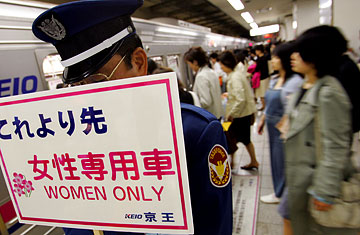
A security guard holds a sign on a women-only passenger train at Tokyo's Shinjuku station on May 9, 2005
Any woman who has been a long-suffering commuter on Tokyo's efficient but overcrowded trains knows that being groped in one of the cars is as dependable as the timetable. Molestation can take many forms: a stray hand, a heavy leaner, a brazen whisperer or flagrant physical contact. To be a woman in Tokyo packed into a rush-hour train is to be inevitably forced to ask oneself, "Did he just ...?" Chances are, the answer is yes.
Despite past attempts to clamp down on the scourge — since 2001, all railway companies operating in Tokyo have offered "women-only" cars — men just can't seem to keep their hands to themselves. In fact, they continue to treat physical assault as a kind of sport. Police say there are more than 100 Japanese websites devoted to groping techniques, and the methods have become more heinous and sophisticated. For instance, men are now traveling in packs that prey on a single woman and are using cell phones to surreptitiously take video or photos.
This week the Tokyo Metropolitan Police Department decided to make another run at the problem by launching Groping Prevention Week, a five-day program designed to spark greater public awareness of the threat and give police a chance to sharpen their ability to identify and investigate occurrences. "We're taking intensive measures to crack down," says a police spokeswoman. "Our intent is to repress groping incidents and raise awareness in society through cooperation with railway companies."
The city assigned 10 special undercover teams to monitor the Tokyo lines with the highest incidence of assaults. Uniformed officers also patrolled major Tokyo stations, such as Tokyo, Ikebukuro and Shibuya, where posters were hung reading "Groping is a crime" and "Groping can ruin your life." Policewomen gave self-defense demonstrations, and TV commercials featuring local high school students were aired to help spread the word.
The campaign comes at the beginning of a new school year, when trains grow more crowded with younger women who might be more vulnerable. Over the past few years, reported incidents and arrests have slowly declined in the Tokyo area; the number of arrests fell 11% in the first six months of the year. And women are increasingly consulting railroad police, a special section of the department that handles railway incidents, about what they should do if they think they've been molested.
But authorities are worried that they are not seeing the bigger picture. Typically, getting cooperation from witnesses has proved difficult for police because many are on their way to work or school when the incidents occur and don't want to be late. There has also been a degree of resistance among victims, as false accusations in Japan can ruin reputations on both sides. Police are concerned that many women choose to withstand the abuse rather than report it, especially as molesters' tactics have become more organized and harder to detect. If this trend continues, "it could degrade the environment in which women can securely ride trains," says the police spokeswoman, who asked not to be identified.
It's hard to say what — if any — lasting effect this awareness blitz will have. By the morning of Sept. 17, the fourth day of the campaign, only 15 alleged perpetrators had been arrested. The National Police Agency says it plans to set up cameras on trains but has not said when that project will begin. In the meantime, women in Tokyo will tell you that a shrill scream, coupled with a jab of an umbrella or a stiletto, is the only defense when one doesn't have room to swing a purse.
— With reporting by Yuki Oda
